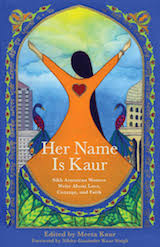Her Name Is Kaur: Sikh American Women Write About Love, Courage, and Faith
Meeta Kaur
|
Meeta Kaur had no idea she would marry, let alone fall in love with another Sikh. A writer and Canadian-born daughter of immigrant Sikh doctors, Kaur, of Union City, was determined to be the community Auntie on a continual global adventure. Then she met Banjot. He was brilliant and handsome — a kind, calming presence who sang her Sting’s “Fields of Gold” and let her be the strong Sikh-American woman she was born to be. Their story is part of a new, first-of-its-kind anthology titled “Her Name Is Kaur: Sikh American Women Write About Love, Courage, and Faith” (She Writes Press, $17.95, 275 pages). Kaur and other contributors will read from the book at a high tea from 4 to 7 p.m. Oct. 25 at the San Jose Gurdwara Library. The groundbreaking collection features 24 universal, soul-searching narratives — 10 written by Bay Area women — on everything from new motherhood and same-sex love to meddling mother-in-laws and the quest for work-life balance. The book unveils the experiences of a community that is virtually invisible in the North American milieu. Sikhism is the fifth-largest religion in the world — half a million Sikhs live in America — yet people know very little about it, especially about the prominent role women play in every facet of life, says Kaur, the collection’s editor. “Sikh women in this country are trained to be in service to family and community as decision makers; they are natural born leaders,” she says. “While it’s great to identify as Indians, we bring something very specific to the table in terms of our spiritual heritage.” Sikhism is a monotheistic religion founded during the 15th century in the Punjab region of India by Guru Nanak and developed through the teachings of 10 successive Sikh Gurus. The religion’s values, Kaur says, are devotion and remembrance of God at all times, truthful living, equality of mankind and the denouncement of blind rituals. It is also progressive, especially for its time and place of origin: Sikhism rejects all distinctions of caste or race and stresses the equality of women. It rejects female infanticide, sati (wife burning), permits widow remarriage and also rejects purdah (veiling), though some Sikh women still choose to wear veils. Yet the issues in this collection are universal, especially to the 250,000 Sikhs living in California. In “LoveSikh: My Journeys for Home and Belonging,” for instance, Sanjeeta K. Luthra writes about her Darji, or grandfather, and his spiritual influence on her, first as a student at Bryn Mawr College in the 1980s, and later as an overwhelmed working mother of two in Los Altos. “People don’t realize that Sikhs drove the reform movement in India in the early 20th century,” says Luthra, an adjunct lecturer in the Department of Anthropology at Santa Clara University. “We are the first generation (of Sikhs) to be brought up in the United States, and this book is a way to make sure our voices are heard.” These stories are also critical, because through the women’s stories, people can learn about the experiences of Sikh men living in America and the Bay Area, where Luthra says her husband, who wears a turban, has been approached in professional circles with greetings such as “Hey, al-Qaida” or “What’s up, Osama?” “Sikh men are typically portrayed as scary or terrorists in this country,” Kaur adds. “But in this book, they are tender and loving and funny husbands and great dads. It’s really important for us to change that fear-based stereotype.” The idea for the collection came to Kaur in 2004, while she was working on her MFA in creative writing at Mills College in Oakland. She read story after story of Jewish women, Latina women and African-American women, yet there was no literature on Sikh women. “We simply did not exist in the broader landscape in American culture,” she says. “We endure many challenges when it comes to our distinct faith identity, but no one knows anything about us and how we live our lives and more importantly, how we love.” As Kaur explains, the Sikh view of love is more expansive than the traditional love story trope allows for. Sikh devotees are supposed to go into each relationship and task with the mindset of love. “Love permeates all aspects of our lives and drives our actions and responses to the world, not only in our intimate relationships but also as parents, as community members and professionals in the world,” Kaur says. You witness it in Jessi Kaur’s “How My Mother-in-Law Became My Mother,” where the Cupertino author chronicles how, by opening her heart and mind, a turbulent relationship became among the most cherished in her life. Likewise, in Jalmeen Kaur’s “Circling the Sun,” through meditation, the Walnut Creek writer finds the strength to carry on after the death of her own mother. As she writes: “She was breathing new life into my tired heart. In that warmth and stillness, there was no expectation. Time stood still. And all that was in that moment was Love.” |

